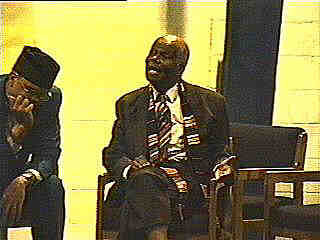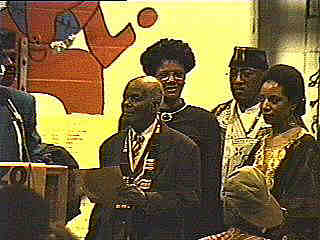|

Dr. John Henrik Clark Speaking at the Dallas-Ft.Worth
Metroplex African American Think Tank (DFW-MAAT). Breaking the Chains of Slavery Lecture Series, 3/12/94

DFW-M.A.A.T and African Bible Fellowship
members Standing Behind Dr. Clarke are Kofu, Dianna and Dr. Edward Sims and Yolanda
Noland.
|
Quotes from Dr. John Henrik Clarke
Dr Clarke’s Words on HISTORY
“History is a clock that people use to tell there political and cultural
time of day. It is also a
compass that people use to find themselves on the map of human geography.
History tells a people where they have been and what they have
been, where they are and what they are.
Most important, history tells a people where they still must go,
what they still must be. The
relationship of history to the people is the same as the relationship of a
mother to her child.”
Dr. Clarke’s Words on
SPIRITUALITY
“Spirituality is a way of excepting the fact that there is a spiritual
force in the universe larger than all of mankind.
But someone had to come along and invent a word called God.
Then some had to serve another God and say mine is better than
yours, and some had to create faith, someone said I have the true
faith.”
Dr. Clarke’s Words on RELIGION
“Religion is the organization of spirituality into something that became
the hand maiden of conquerors. Nearly
all religions were brought to people and imposed on people by conquerors,
and used as the framework to control their minds.”
Dr. Clarke’s Words on the IMAGE
of GOD
“My main point here is that if you are the child of God and God is a
part of you, the in your imagination God suppose to look like you.
And when you accept a picture of the deity assigned to you by
another people, you become the spiritual prisoners of that other
people.”
Dr. Clarke’s Words on LEADERSHIP
“I think every person that calls themselves a leader, a preacher, a
policy maker of any kind should ask and answer the question in his own
life time, how will my people stay on this earth? How will they be educated?
How will they be schooled? How
will they be housed? And how
will they be defended? The
answer to these questions will create the concept of enduring nationhood
because it creates the concept of enduring responsibility.
I am saying what ever the solution is, either we are in charge of
our own destiny or we are not in charge.
On that point we got to be clear, you either free or you a
slave.”
|
